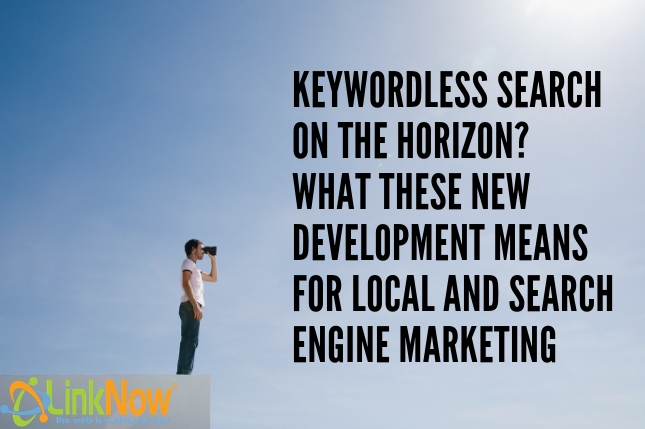


As reported by Merkle. and Search Engine Land, Google has rolled out an experimental ad campaign that delivers the ability to target searches locally without keywords. Appearing as an option for some storefront-based businesses operating in certain qualities, this new model does not require advertisers to bid on specific keywords to attract users’ search queries; instead, Google will present options to searchers based on information in the Google My Business listing.
For example, rather than bidding on keywords such as ‘coffee’ or ‘local café,’ café owners will be able to select these new ad categories, which will present searchers with location info when they search words and phrases associated with the type of business. This can provide for broad and flexible search results—without escalating into bidding wars over the most popular local search keywords.
We’re not sure exactly how Google has determined which categories of business to offer this service to, or if there are certain ‘trigger words’ or phrases in a business’s GMB info that designate them as a good candidate for these types of ads. Furthermore, we’re not even sure whether or not Google will add this feature as a permanent service; Google runs product experiments all the time that don’t end up making the cut.
There is one thing we know for sure, however: this indicates Google’s abilities with machine-language processing are becoming so complicated that it’s time for local businesses and search engine marketers to start looking towards a future where keywords are no longer relevant.
We recommend you click through to Merkle’s page that we’ve listed above; they’ve compiled all the search data from these new keyword-free local searches into some helpful infographics. The main takeaway, however, is that the vast majority of these types of ads were provided to mobile and tablet users—a combined 76% between the two device types.
While desktop users also represented a healthy share of 22% of the traffic put up by these new ads—and a healthy 5.5% of the click-through rate—click-through rates were significantly higher for mobile and tablet users, averaging at about 8.9%. Given that the future of search is mobile and voice-assistant anyway, and that customers are more likely to be searching for storefront business categories when they’re out and about on their phones anyway, these results make sense.
So, there are three factors that immediately qualify (or disqualify) your business for these new experimental ads: you need to have a storefront, you need to have the right information in your GMB listing, and you need to be an existing client with Google Ads. There is a fourth qualifying factor as well, according to Merkle: these campaigns are not organized around branded searches. If you’re the manager of a Starbucks franchise, you won’t be offered these ads—at least not based on brand-associated phrases like ‘venti’ or ‘Frappucinos near me.’
Some businesses are more likely to benefit from this than others. The competition will be tight for some categories. Companies that offer a broad scope of products may be put at a disadvantage; intuitively, Google is less likely to provide these products for business types that don’t immediately provide a customer with info on what they’re looking for. For example, if you run a small-engine repair studio, but you specialize in vacuums, odds are you won’t be offered a chance to try one of these new keywordless local ads; there’s too great a risk for Google that they display ads to the wrong audience given that you work in a broad category but within a particular niche.
So: do expect the chance to try these ads if your business neatly slots into an existing consumer category, but don’t expect to take advantage of branded queries. If your shoe store only sells Nike products, you’re out of luck.
As mentioned above, these ads appear to be gleaning information from GMB listings to determine the audience and market that’s right for these ads. It’s similar to Local Pack ads in that way but appears designed to appear in both Google Maps and regular Google Search queries.
Brick-and-mortar operations always had the option to add location extensions to fine-tune local search queries, but these seem more straightforward to use for the average technologically-challenged small business owner.
What this indicates for sure is that optimizing your GMB listing for storefront businesses is more important than ever—and that’s whether or not you’ve already a user of paid search campaigns through Google Ads. After all, with the addition of business descriptions and ‘menus’ and prices for GMB listings for a wide variety of business categories, it’s evident that Google is banking on the fact that the future of search is local.
Optimizing your GMB listing to include keyword-rich business descriptions as well as a breakdown of services you offer at the prices you offer them is right for your business in two ways: it may allow you to take advantage of this new ad category, but it will certainly ensure your business stays competitive in local searches. Providing this information isn’t just great for your business—it’s also great for potential customers, who are clicking through to websites less than ever before.
Making all the relevant information about your business visible from the Search Engine Results Page (SERP) drives visits to your business both on- and offline.
While we can’t promise that optimizing your GMB listing will lead directly to taking advantage of this powerful new ad category, we can guarantee it’s the right thing to do as we move into the future of search.
This part is easy enough. Again, we can’t promise that following these steps will get you the option to try one of these new ads; after all, Google still seems only to be offering these on an experimental basis, and there’s been no word among the major search engine websites whether or not these ads are going to become a wide-spread or regular feature of Google’s ad options.
Luckily for most small businesses, optimizing your GMB listing is simple. Here’s a quick breakdown of the steps you can take today to verify and optimize your GMB listing. Performing all these tasks should take you just under an hour:
The first step towards achieving your goal of activating keyword-free local search campaigns is to claim your Google My Business listing. If you have brand new business—started within the last six months or so—it’s possible that there won’t be a GMB listing created yet, but odds are that one exists for your business, whether set up by someone else at your workplace or by a customer looking to add their favourite brunch spot to their favourite search engine.
Verifying a listing is easy. You need to confirm the address and phone number of your business. To do this, Google will phone your company and give you a PIN that you can input on the verification page, or, if you don’t mind waiting for snail mail, you can have that same PIN sent to your business address on a postcard. You can find in-depth details, including a tutorial video, here. From there, the hard part is over—the next step is to add your business’s contact info!
This part is easy. Simply navigate to the ‘info’ tab on your newly-verified GMB account. Input all the information searchers will need to know about your business. Crucial information you’ll want to include is:
Don’t worry if you don’t fill it all out at once, or if you change your hours. Once your listing is verified and tied to your Google account, you can make changes at any time. Just log back in and edit to your heart’s content—and while you’re at it, add a new GMB post or some photos! Google favors businesses with active, regularly-updated listings, so edits and change can only benefit you and your bottom line.
So it’s still very unclear what these keyword-free local ads mean for the future of search. We don’t even have confirmation that this ad product will be rolled out widely yet, after all. However, some SEOs are calling this the advent of keyword free searching in general, including for organic search.
That’s a crazy future to imagine, but it might also be the one we’re living in. Soon, at least. Google’s (and other search engines) natural-language processing powers are increasing exponentially. Even since 2010, the changes in search have been dramatic and difficult to keep up with.
What may displace keywords as the future of search are highly sophisticated algorithm-based choices that can directly target your ad to specific audiences searching for specific services in specific locations. You don’t need to know that they’re looking for “coffee near me” to know they want a coffee near them—Google will be able to extrapolate this data from other users to predict whether a given searcher is interested in local cafes and place targeted ads without a single keyword making it onto an ad campaign.
It’s a strange future to think about. But in many ways, it’s the logical extension of the sorts of changes Google has been rolling out for the past decade. And as we see Google push to exclude organic traffic from search results, it’s a worrying sign for SEOs and content marketers in general. Businesses of the future will have to adapt. Unfortunately, we don’t yet know what we’ll need to adapt to. But this might be a good place to start looking.
Can’t tell the difference between keywords and Adwords? Struggling with setting up your first—or fifth—pay-per-click campaign? LinkNow Media offers clients complete web design and search engine marketing packages, including local listings, GMB management, and pay-per-click ad campaigns, all at incredible monthly prices that can’t be beat.
We’ve built our business to nearly 10,000 clients over the past decade, and every single one of our customers is free to leave at any time. With no monthly contracts, we work hard month after month to keep our clients satisfied—and at the top of the SERPs.
Want help bringing your business online? Need to troubleshoot setting up a keyword-free ad on Google Ads? Pick up the phone and give us a call today to get started.
Share: